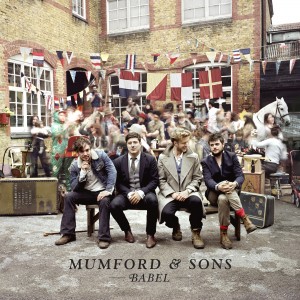 It’s difficult to write a review aware that it will serve no purpose. After the phenomenal success of their debut album Sigh No More, Mumford & Sons now find themselves with a legion of devoted fans. Folk fans, pop fans. People who enjoy a good foot-stomp. People who list amongst their hobbies ‘singing loudly whilst swinging plastic cups of beer over my head’. It’s the adoring crowd that their album deserved, but it leaves a reviewer with a certain lack of purpose – the entire nation has already made up their minds about whether or not they will be buying Mumford & Sons’ new album.
It’s difficult to write a review aware that it will serve no purpose. After the phenomenal success of their debut album Sigh No More, Mumford & Sons now find themselves with a legion of devoted fans. Folk fans, pop fans. People who enjoy a good foot-stomp. People who list amongst their hobbies ‘singing loudly whilst swinging plastic cups of beer over my head’. It’s the adoring crowd that their album deserved, but it leaves a reviewer with a certain lack of purpose – the entire nation has already made up their minds about whether or not they will be buying Mumford & Sons’ new album.
Which is a shame, because Babel is not everything it should have been, and is certainly not what Sigh No More was. It is a challenge that many a band has faced in the question of how to follow up an incredible chart success. Should the band attempt to repeat that success, and pay no heed to their desires to develop as an act, or should they use their fame as a safety net to catch them as they experiment with new sounds, and try and reach the next peak in critical acclaim (and personal development)? Each way has its victims – Nickelback for the former, Radiohead for the latter. The key is to hit a healthy balance between the two, as Elbow demonstrated with their follow-up to the massive success of The Seldom Seen Kid. Their next album included a few songs of the same grandeur as breakout hit ‘One Day Like This’, but also pushed the listener with some more obtuse (but nevertheless beautiful) songs that better represented their interests as a band.
When faced with the same challenge – sticking to the format that brought them album sales, fans, Hollywood actress wives or growing and developing their sound – Mumford & Sons also opted to mix the two. Unfortunately, they did so by picking out the most immediately popular aspects and choosing to develop only those. Babel lacks much of the quiet, thoughtful moments that broke up its predecessor, and fills them with MORE FOLK! MORE BANJO! MORE BIG, STOMPING MUSIC!
Take the title track of Babel, which starts aggressively big and then, eight seconds later, realises that its dial goes all the way up to eleven, and adjusts accordingly. Over the next three tracks the band’s banjo player gets so much work it’s hard not to worry about his fingers whittling themselves to stubs. It might not be possible to accurately explain just how much banjo there is in ‘I Will Wait’. Suffice to say, it represents at least forty percent of all banjo notes played in Britain so far in 2012.
The song is perhaps the best example of Babel‘s failings – drawn out from an untitled first album b-side, the reworking injects a shouty festival-friendly chorus and about an assault of folk noise at the cost of the original song’s subtlety and beauty.
It’d be unfair to suggest that Babel is necessarily bad – it’s sculpted with the sole intent of being enjoyable. On songs like ‘Lover of the Light’ you’d be hard-pressed to keep either of your feet
entirely still. If it weren’t so focused on crowd-pleasing, Babel would be a fairly subversive pop record – the first guaranteed number-one album in years to be built on Christian sentiment. “I was
told by Jesus all was well/So all must be well” sings Marcus Mumford on ‘Below My Feet’. It’s at these moments the album feels a little less calculated and a little more meaningful. Elsewhere, closing track ‘Not With Haste’ provides a real highlight; here the sincerity is, for once, not under-served by over-eager instrumentation.
But ultimately the album grossly underestimates its fans’ willingness to listen to anything beyond a wall of sound in which every brick is a banjo. If the band want a quick and easy success, they’ve done well in focusing only on those elements of their music that were loved by all first time round. In this sense, calling the album Babel was the wisest decision made. Because here they are, trying to speak a universal language when, in a world of ever diversifying musical tastes, such a thing cannot exist.
Words: Stephen Thomas

4 comments for “Album | Mumford & Sons – Babel”